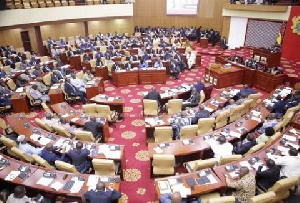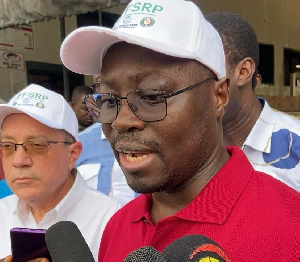A study on the performance of Ghana’s seventh parliament by a Civil organization, Odekro, indicates that a total of 54 MPs absented themselves without written permission from the Speaker Prof. Mike Oquaye.
This chronic absenteeism according to reports aside its violating of Article 97(1) (c) has resulted in a GHS1.4million direct monetary cost to taxpaying Ghanaians.
According to the report, only 3 MPs never absented themselves without written permission from the Speaker.
They are Emmanuel Agyei Anhwere Atwima-Nwabiagya South (NPP), Habib Saad Bortianor-Ngleshie Amanfro (NPP) and Twumasi Kwame Ampofo Sene West (NDC).
"In total, 54 MPs absented themselves without written permission of the Speaker from 15 sittings and above in clear violation of Article 97(1)(c). Their chronic absenteeism resulted in a GHS1.4million direct monetary cost to taxpaying Ghanaians."
Below is a summary of our findings:
1. Though Speaker Oquaye has been and is a staunch advocate for review of some aspects of the 1992 constitution, however, his silence on Article 78(1) is problematic. Article 78(1) empowers the President to appoint majority of his Ministers from Parliament. 34 of the 71 Ministers and Deputy Ministers appointed from Parliament, representing 47.8% violated chronically absented themselves from parliamentary sittings, thus violating Article 97(1)(c).
2. The First Session of the Seventh Parliament reviewed over 20 Bills and on average, nearly passed all these Bills (over 90% approval rate) and used on average 29.4 days to approve a Bill. Legislative activity on amendments to tax Acts and local governance issues, mostly done under certificate of emergency, generally took less than a day to be ratified. They include the Local Governance (Amendment) Bill, 2017; Income Tax (Amendment) Bill, 2017; Special Petroleum Tax (Amendment) Bill, 2017; Customs and Excise (Petroleum Taxes and Petroleum Related Levies) 2017; Special Import Levy (Amendment) Bill, 2017; and Appropriation Bill, 2017.
Most of the bills laid before Parliament, during the First Session, stemmed from the ruling party’s (NPP) 2016 Manifesto – notably the three development bills, the Office of the Special Prosecutor Bill (2017), and amendments/repeal to tax acts. But then, as indicated earlier, the government was keen on getting the economic fundamentals in shape; hence the comparatively faster speed with which the tax amendments were ratified against the Development Bills and Office of the Special Prosecutor Bill (2017). Besides economic growth, exactly how these tax amendments will materially improve local businesses, the working conditions of workers in the sectors affected and the general economic wellbeing of Ghanaians is yet to be established with empirical evidence. It should also be stated that whilst the tax acts involved simple amendments and repeal, the Development Bills and Special Prosecutor Bill (2017) were newly introduced bills conceptualized from scratch and therefore had to be subjected to the full processes of law making.
3. Three MPs never absented themselves without written permission of the Speaker. They are Emmanuel Agyei Anhwere (MP, Atwima-Nwabiagya South), Habib Saad (MP, Bortianor-Ngleshie-Amanfro) and Twumasi Kwame Ampofo (MP, Sene West).
4. In total, 54 MPs absented themselves without written permission of the Speaker from 15 sittings and above in clear violation of Article 97(1)(c). Their chronic absenteeism resulted in a GHS1.4million direct monetary cost to tax paying Ghanaians.
5. There are few women in Parliament partly because some systemic and socio-cultural barriers still exist. Speaker Michael Oquaye’s vision of ensuring the passage of the Affirmative Action law is yet to materialize and perhaps the Second Session of Parliament might offer a glimmer of hope. An in-depth analysis of women candidates contesting for Parliamentary seats and the experiences of women MPs in the Seventh Parliament will be conducted in a separate report. Speaker of Parliament Professor Michael Oquaye has long advocated more women in Ghana’s Parliament. In his research paper “Reserving Special Seats for Women in Parliament: Issues and Obstacles” published in 2012, the Speaker recommended that reserved seats be adopted in Ghana as one of the ways of increasing the number of women MPs. It is imperative that the Speaker ensure the passage of the Affirmative Action law during his tenure. The current men to women ratio 6:1 is disturbing and does not offer an accurate representation of the gender distribution of the population. Although there is no observable significant difference between men and women MPs’ rate of absenteeism, the stark numerical disparity between the sexes coupled with the ministerial status of some women MPs makes it difficult to draw very accurate conclusions in respect of the performance of women MPs.
General News of Thursday, 14 June 2018
Source: www.ghanaweb.com













